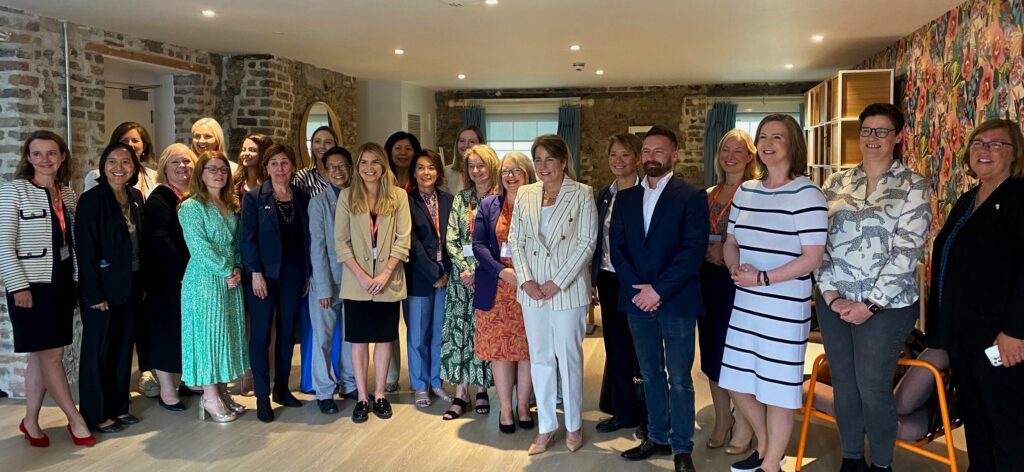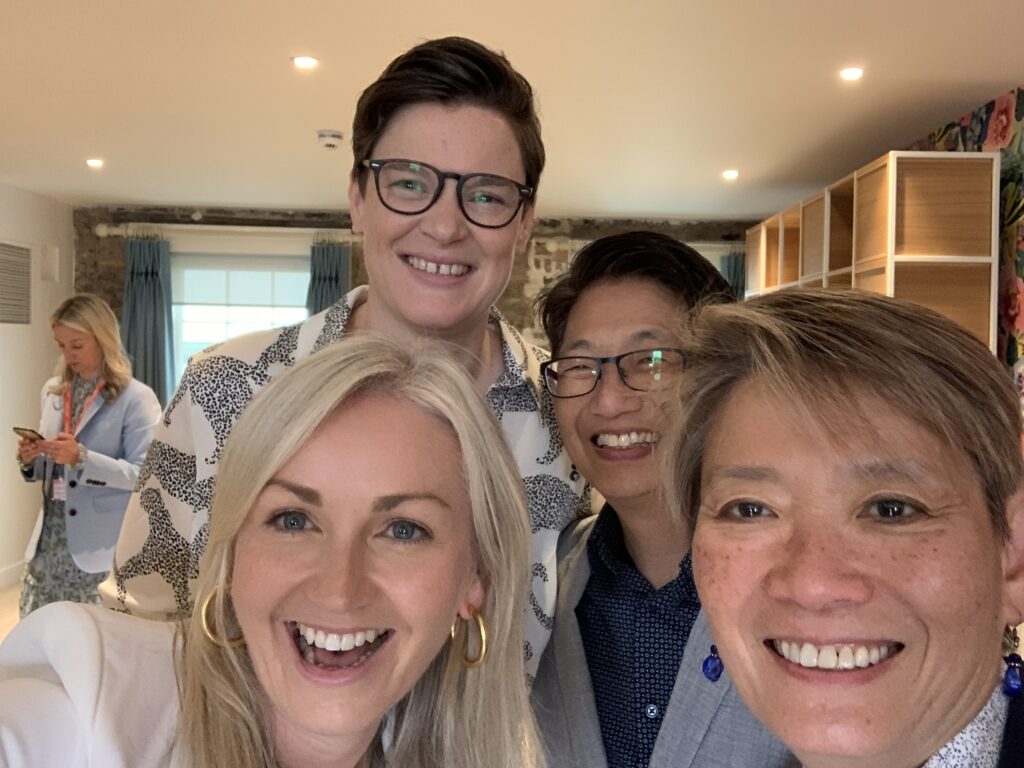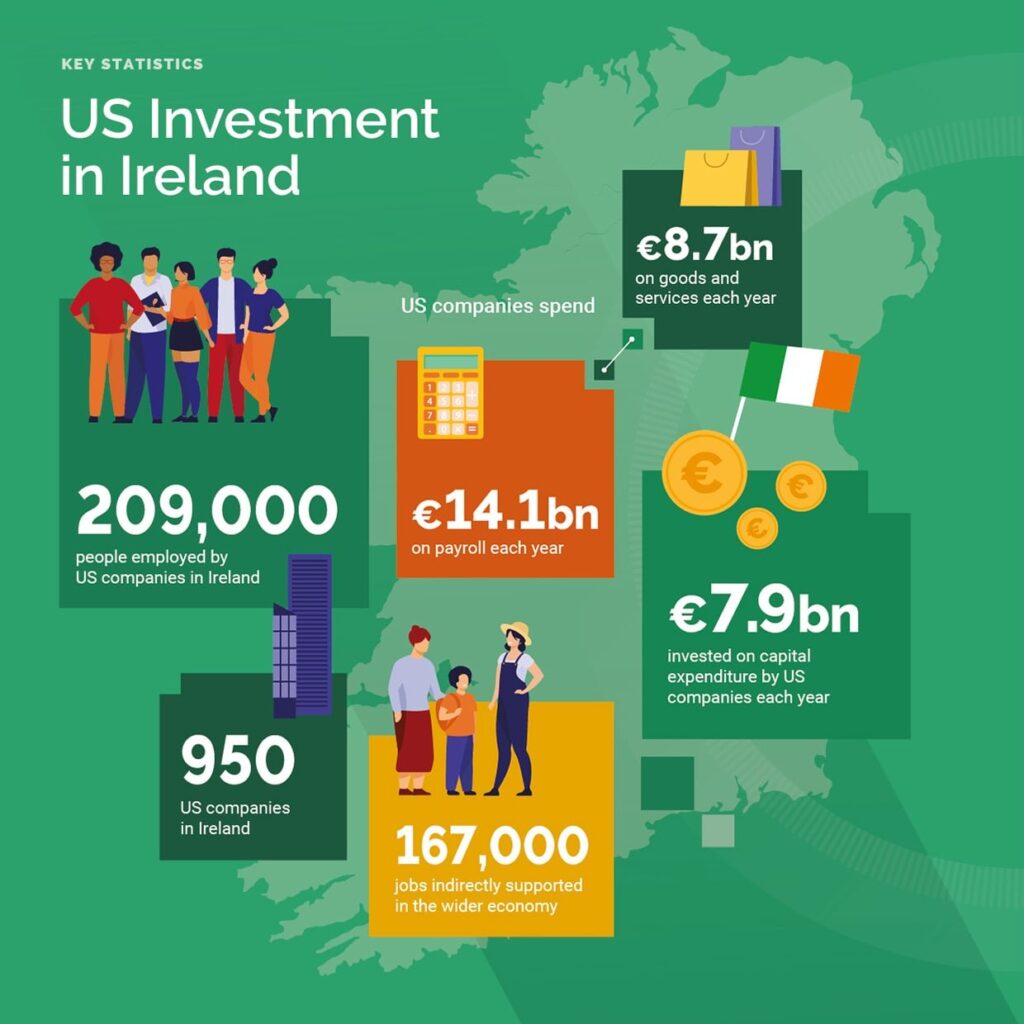
Author: Written by Susu Wong
From June 26 to June 29, 2023, I had the opportunity to accompany Chancellor Julie Chen of UMass Lowell to Dublin, Ireland, for a unique and exciting mission. Governor Maura Healey’s staff invited Chancellor Chen to organize a higher education sustainability roundtable, forging a path of collaboration between Massachusetts and Ireland in the realm of higher education. We also attended a tech event hosted by Hubspot, sparking discussions on tech innovation, workforce development, and the potential for joint ventures between the two regions. In this blog, we will explore the highlights of this visit, shedding light on the successful partnership and its numerous benefits to Massachusetts and Ireland.
Tech Event hosted by Hubspot
The higher education sustainability roundtable was a pivotal platform for exchanging ideas and strategies within higher education institutions. Parallel to the roundtable, the tech event hosted by Hubspot was a vibrant occasion that brought together professionals from tech companies with a presence in both Massachusetts and Ireland.
Kicking off with a networking breakfast for women in tech, the event aimed to empower and inspire women professionals within the industry. Many women we met were drawn to Ireland’s vibrant culture, diversity, and job opportunities. I met representatives from Boston Scientific, Fidelity, Progress Software, Rapid7, Toast, and many other tech companies. In addition to Governor Healey, I met Yvonne Hao, Secretary of Economic Development, and Rebecca Tepper, Secretary of Energy and Environmental Affairs. Undersecretary of Economic Strategies Sarah Stanton, MassTech Collaborative Executive Director Carolyn Kirk, and MA Competitive Partnership CEO Jay Ash.

The Tech Event was a unique opportunity to meet each other and find many common grounds. The event fostered a sense of shared purpose and a commitment to addressing global challenges through education and innovation. The subsequent roundtable discussions delved into the reasons behind the success of collaborations between the two regions, highlighting the mutual benefits and potential for further growth. Among the discussions and a report from the American Chamber of Commerce in Ireland, it was highlighted that there are now 950 US companies in Ireland, employing 376,000 people directly and indirectly and spending more than €31 billion in the Irish economy annually. Meanwhile, Ireland remains the 9th most significant foreign direct investment (FDI) source to the US, with 650 Irish companies employing over 100,000 people across all 50 states.

Promising Partnerships and Economic Impact
Massachusetts and Ireland have thriving tech ecosystems, with many companies emerging as spin-offs from VC-funded ventures and universities. Both countries benefit from entrepreneur hubs, VCs, and accelerator programs. In Massachusetts, we have over forty accelerators, such as Mass Challenge, Tech Stars, EforAll, and The Capital Network, that help startups in different segments, including life sciences, clean tech, fintech, etc. The cultural fit between the two regions, buoyed by significant Irish-American immigration to the US, creates an environment conducive to meaningful collaborations. Governor Healey herself, with Irish heritage from her grandparents who emigrated from counties Cork, Kerry, and Galway, Ireland, serves as a testament to the strong cultural ties between Massachusetts and Ireland. It is estimated that one out of five Massachusetts natives have Irish heritage.
Beyond the cultural connections, a shared language and proximity further strengthen the partnership. Regular nonstop 5-6 hour flights allow easy travel between the two countries. The same is true for the 5-hour time zone difference, enabling employees to care for their families by freeing up a half day to schedule meetings. In addition, Ireland’s membership in the EU provides easy access to other EU countries, making it an appealing gateway for US companies seeking to expand their operations in Europe without the burden of immigration and work visas. This convenience fosters cross-border collaboration and supports the mobility of talent and resources.
Key Collaboration Factors and Education Opportunities
A crucial factor driving successful collaborations is access to an educated workforce. Both Massachusetts and Ireland boast top universities and colleges, nurturing a skilled talent pool ready to contribute to the tech sector’s growth. In the discussion, it was interesting to hear how initially, because of tax breaks and lower costs, US companies used to outsource backend programming and customer support to Ireland as an extension of their workforce. Now companies are offering product engineering and more sophisticated work opportunities that are more exciting than back-end work. Students from the US can participate in the J1 Summer Graduate Program, allowing them to be there for one year or up to 5 years if they enroll in the J1 STEM program, offering enriching educational experiences in Ireland.
Additionally, the Tech and the Higher Ed/Sustainability roundtables discussions emphasized the significance of internships, apprenticeships, and career awareness initiatives. Both regions actively foster talent development and offer hands-on experiences by providing such opportunities, contributing to a thriving tech industry.
The visit of Chancellor Julie Chen and Governor Maura Healey to Ireland has been a pivotal moment in strengthening collaboration between Massachusetts and Ireland in the tech and higher education sectors. The shared values of diversity, sustainability, LGBTQ+ rights, and women’s reproductive rights form a solid foundation for future partnerships. By leveraging each other’s strengths and fostering a culture of trust and transparency, Massachusetts and Ireland are paving the way for innovative breakthroughs and a brighter future for both regions. It is essential to establish criteria such as political landscape, diversity, culture, human rights, and access to human capital by defining their international footprint to ensure it is a right fit. Together, they prove that collaboration knows no boundaries and that unity in purpose can profoundly impact a global scale.
